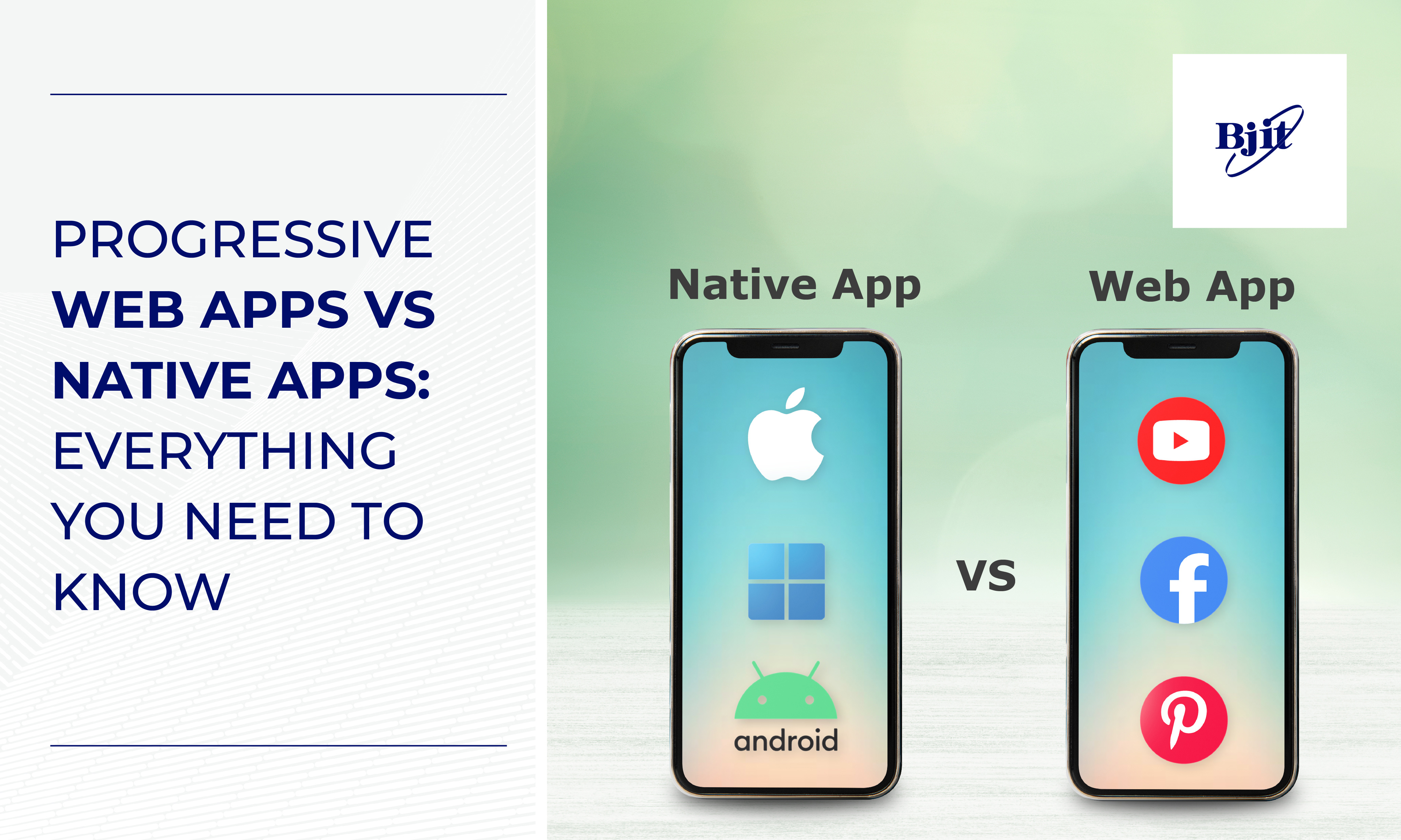Today, our topic is Progressive Web Apps (PWA) vs. Native Apps. We will cover everything you need to know about this topic.
First, let's discuss some key factors in PWA and native apps. Indeed, they are not incompatible. Taking the place of the latter isn't meant by the former.
An app built using web platform technology is a PWA. A software program built on a specific platform or device, such as Android or iOS, is a native app.
Progressive web apps use standard technologies like HTML, CSS, JavaScript, and Web Assembly. People usually download native apps from apps like the Apple App Store or Google Play Store.
However, let's learn about them in detail from below.
Understanding Progressive Web Apps (PWAs)
A progressive web app is between a responsive website and a mobile app. PWAs are mobile sites developed with modern JavaScript frameworks designed to provide an app-like experience. You can add icons to a mobile device's home screen. PWA offers a full-screen experience to engage users, such as apps.
Remember that when you open them, they are still just websites. With the development of service workers, PWAs get more benefits than native apps, but mainly on iOS, and these benefits are still limited.
Benefits of using PWAs
- Improved user experience:
PWAs look and feel like ordinary phone apps. Progressive web apps are already connected to the web and don't require app updates. They can send push notifications, which are currently available only on Android. For people who are using a PWA, that means they are tuned to the latest app version.
- Increased engagement:
PWAs can increase engagement. They are designed to boost engagement and speed up mobile phone load times through push notifications.
- Reduced development costs:
Interestingly, you can develop PWAs using web technologies, which leads to lower development costs for different platforms than building separate native apps.
Exploring Native Apps
Native mobile apps are built to utilize the hardware capabilities of a particular mobile device and deliver an engaging user experience. They are usually installed from app stores on iOS or Android.
Native apps can provide faster performance and use the hardware’s capabilities more effectively as they are developed for a specific OS. It will cost more money, time, and effort to create native apps that are designed separately for iOS and Android platforms.
To make native apps successful, you must get validation from app stores and massive app store optimization for marketing before launching a native mobile app.
Benefits of using native apps
- Access to device features:
Native app development is the only suitable option if you’re planning to build a mobile app that should have direct fail-safe access to a camera, microphone, or Bluetooth. Native apps not only interact with other native apps without boundaries but can also leverage smartphone hardware. By contrast, implementing these capabilities for a PWA may become a challenging or even impossible mission.
- Improved performance:
The main “calling card” of native applications is the outstanding user experience. These apps are built according to the technical requirements of a specific platform, such as iOS or Android.
You will be guaranteed an app that perfectly matches the platform, demonstrating flawless usability and seamless UX/UI when using a native programming language and APIs.
Native app development allows you to be more creative with in-app functionality and add the most sophisticated features to your product.
- Enhanced security:
Apps that store sensitive data hardly need to apply this factor. Native apps can utilize the OS's built-in security features, making them less vulnerable. You can quickly implement two-factor authentication or robust encryption to protect customer data from leakage.
Comparison of PWAs and Native Apps
Progressive Web Apps (PWAs) and native apps are designed to provide users with a mobile app-like experience. However, there are some critical differences between the two technologies.
Performance
PWAs are web apps designed to look and feel like native apps. They are typically built using HTML, CSS, and JavaScript and delivered to users through the browser. Because PWAs are web apps, they do not need to be installed from an app store, making them easier to distribute and update than native apps.
Native apps are developed specifically for a particular platform, such as iOS or Android. They are typically written in the platform's native programming language and installed from an app store. Native apps are generally more performant than PWAs, as they can more directly access the device's hardware and software.
Functionality
PWAs can offer many features, including offline support, push notifications, and access to the device's camera and microphone. However, they are limited by the browser's capabilities. For example, PWAs cannot access the device's file system or send SMS messages.
Native apps have full access to the device's hardware and software to offer more features than PWAs. For example, native apps can access the device's file system, send SMS messages, and make phone calls.
Distribution
PWAs are distributed through the browser so that users can access them on any device with a modern browser. Native apps are distributed through app stores, so they are only available to users on the platform for which they were developed.
Cost
PWAs are typically less expensive to develop than native apps. This is because PWAs can be built using web technologies that are familiar to many developers. Native apps, on the other hand, require developers to learn a new programming language and development environment.
Future Trends and Outlook
PWAs will continue to grow in popularity
PWAs will continue to gain traction, especially as they become more feature-rich and offer a better user experience. They will be trendy for businesses that want to reach a broad audience without developing separate apps for each platform.
Native apps will remain important
Despite the growth of PWAs, native apps will continue to play a significant role in the app ecosystem. They will be substantial for businesses needing device-specific features or offering a more immersive user experience.
Hybrid apps will become more common
Hybrid apps that combine the best features of PWAs and native apps will become more common. They will be a good option for businesses that want the reach of a PWA with the functionality of a native app.
Impact of emerging technologies on app development:
5G will revolutionize app development
5G will significantly impact app development by enabling the development of more immersive and real-time experiences. It will also make it possible to develop apps that use augmented reality (AR) and virtual reality (VR).
Artificial intelligence (AI) will change how apps are built
AI will increasingly automate app development tasks like code generation and testing. It will also be used to create more intelligent and personalized apps.
Blockchain will open up new possibilities for apps
Blockchain will enable the development of more secure and transparent apps. It will also make it possible to create apps that use decentralized networks.
How BJIT Copes with PWA and Native Apps
BJIT stands out in mobile app development by expertly balancing the strengths of Progressive Web Apps (PWAs) and Native Apps. We ensure they meet diverse client needs and stay ahead of technological trends.
Distinct Advantages
PWAs offer cross-platform compatibility, lower development costs, and offline functionality, making them ideal for businesses seeking wide reach and easy access through web browsers. Native apps, on the other hand, provide superior performance, richer user experiences, and deep integration with device features, making them suitable for projects prioritizing performance and advanced functionalities.
BJIT's Tailored Approach
BJIT customizes its approach based on client requirements, target audience, and goals. For broad reach and cost-efficiency, it develops robust PWAs using advanced web technologies like React, Angular, and Vue.js. For high-performance needs, skilled iOS and Android developers create optimized native apps with Swift and Kotlin, ensuring top-notch user experiences and device integration.
Adapting to Market Trends
BJIT stays updated with the latest trends in both PWA and Native App technologies, offering cutting-edge solutions and maintaining a competitive edge. They integrate progressive enhancements in PWAs and adopt new iOS and Android features in Native Apps, staying ahead of the curve.
Commitment to Quality
BJIT prioritizes quality and performance, employing rigorous testing to ensure reliability, security, and usability in PWAs and Native Apps. Their dedication to continuous improvement and best practices guarantees exceptional digital solutions.
Conclusion
The debate between progressive web apps (PWAs) and native apps will likely continue. Both technologies offer advantages and disadvantages, and the best choice for a particular project will depend on various factors, including the project's budget, timeline, and target audience.
Ultimately, deciding to develop a PWA or a native app is complex and requires careful consideration of all the factors involved. By understanding the differences between the two technologies, businesses can make an informed decision that will help them achieve their business goals.











